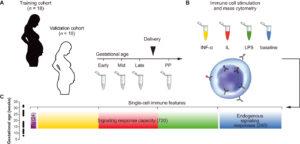Cyto is an annual conference organized by the International Society for Advancement of Cytometry. Cyto is one of the few conferences where researchers from diverse fields such as cancer, infectious diseases and plants immunology, as well as computational analysis and statistics, come together and share their knowledge. The conference not only provides a platform for individuals to showcase their research, it also facilitates workshops that present recently available cutting edge tools for analysis of cytometry data.
During the Computational Informatics workshop, researchers showed the utility of computational analysis for speedy analysis of large flow and mass cytometry datasets, as well as identification of novel subsets using unbiased approaches. One of the speakers in this session was Nima Aghaeepour from Stanford university. Nima Aghaeepour presented on “Profiling Term Pregnancy using a Multiomics (Transcriptome, Proteome and Microbiome) Approach”(see abstract for details). One of the highlights of his talk was the utility of mass cytometry in determining an immune clock of pregnancy (see Aghaeepour et al., 2017). Mass cytometry is a mass spectrometry technique that enable the detection up to 40 parameters at a single cell resolution.
Aghaeepour et al.,used mass cytometry to measure phenotypic and functional kinetics in “normal” women during pregnancy. Samples utilised in the study were collected during the first, second and third trimester, as well as 6 weeks postpartum. Researchers observed an enhancement of some functional innate immune responses from neutrophils, natural killer cells and monocyte during pregnancy. Term pregnancy was also associated with increasedl evels of IL-2 and endogenous STAT5Ab signalling in CD25+FoxP3+Treg CD4, CD8 and γδ T cells.
Overall this study showed the utility of mass cytometry and computational analysis for detections of changes associated with term birth. Additionally, a study such as this enables identification of biomarkers of “normal” term pregnancy, that can be used to determine individuals at risk of preterm birth and other pregnancy-related pathologies.
Article by Cheleka Mpande













